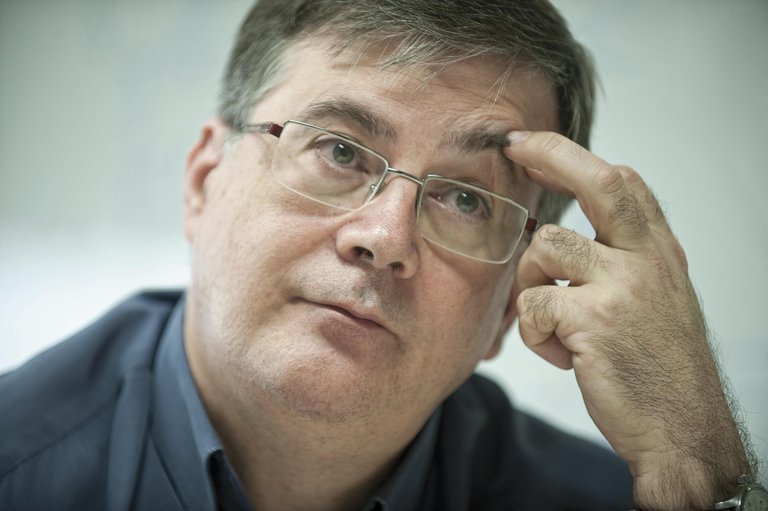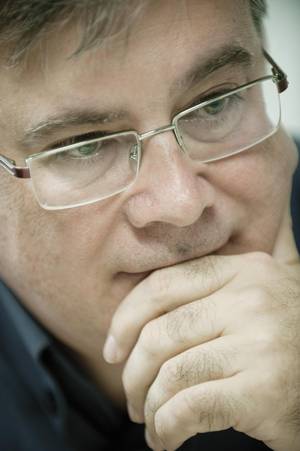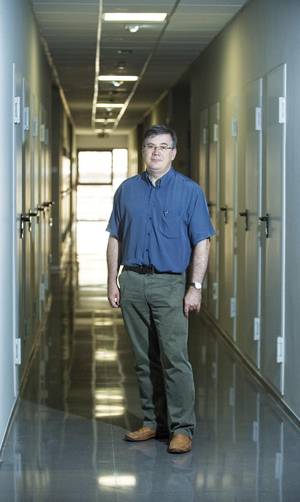"The curricula of current researchers are much better and competitiveness and pressure are increasing"

Yes, because the Ikerbasque team is very good and effective. In this case, it is possible to reconcile research and management.
The criteria and conditions have been met. There are very well defined procedures for evaluation, and we in all steps have followed these regulations very well to ensure the outcome.
It is difficult. It should be noted that here 40 years ago the research was not very developed. The Basque Government began developing the scientific system about 30 years ago. Although history is very short, development is evident. I think the level of research we have here today is worthy and in some areas is very good.
Some natural sciences are highly developed: physics, chemistry, mathematics, molecular biology, biochemistry... The level of research we currently have in these areas is good, since these natural sciences are very consolidated and have a tradition of their own. There are other more recent but highly developed areas in the Basque Country, such as nanosciences and neurolinguistics.
It is important to implement coordinated management. We have a multi-center network and the development of coordination between these centers will be very important. But it is also important to guarantee the autonomy of the centres. And if we implement a bureaucratic system, this can be very negative for both centers and the network.
Scientists always think we don't have enough resources. But it must be taken into account that Euskal Herria is small, so it is not possible to achieve the necessary critical mass in all areas. We have to choose in which field we are going best and in which we want to improve. It is impossible for everything to develop well. I believe that in the most developed areas we have barely reached the necessary critical mass: To match the level of other European centers, we still have to attract researchers, but the goal is close. However, in other areas it will be difficult to get that critical mass you mention.
In the field of biomedicine, for example, we have to be able to attract researchers. This framework is very important and we need to do something more to get the level of research needed.
Ikerbasque appears in international radars. As a foundation for science, Ikerbasque enjoys prestige and is very interesting for researchers. I want to emphasize that the goal is to make 20 contracts, yes, but for us the important thing is quality. That means if there are 13 high-level researchers, we will hire those 13; we will not lower the level to reach twenty. The goal is quality, not the expected number.
That would be a stop. To date we have hired 99 researchers. As I said before, for us the most important thing is the level and not the mere number. In any case, it would be okay to achieve this goal.
Yes, and it is also logical. Some researchers say: "What does Ikerbasque do to improve the teams and infrastructures of the researchers present here? ". On the one hand, our intention has been to integrate the scientists always attracted in a local research group, to take advantage of the experience that this research group brings to the researcher. It is understandable that the researchers here want the conditions that Ikerbasque researchers have; I also want, in some cases. But we have to create critical mass and, on the other hand, we have budget problems. I would like to help scientists here, but I have to recognize that today is difficult.
Yes, it is true. Previously there was a condition that the researchers here could not participate in the Ikerbasque programs, but we eliminated it. Now they can also participate in our young and senior research programs here, as long as they do not have a stable contract. In addition, it aims to launch a new program of support to the quarry and recovery of young researchers abroad. We know that this time is not the best time, but we have already developed the program of recruitment of young researchers and now we want to launch this new project as soon as possible.
I don't think salary is the most important criterion. Of course, it is necessary to have a living wage, but the conditions for developing the research must also be worthy. This implies the need for a scientific journey, adequate infrastructures, contacts, a favorable environment... And freedom of investigation is also necessary. The Ikerbasque criterion is excellence, but no area is defined if it is a high-level research.
It is difficult to guarantee. Over time the route can be stabilized. But I do not think that from the beginning it is convenient to have everything guaranteed and have a fixed position. People are changing, but it is important that the environment offers opportunities to the researcher so that he can take the path that interests him.
Yes, at first that race is very nomadic. But it is inevitable. Where can you learn how to make a science of excellence? MIT, Hardvard, CERN... It is essential to go and learn. It is about taking advantage of the experience that is achieved there. How? Recovering these researchers.
Yes, it is. And in addition, curricula are much better and competitiveness is increasing. And the pressure is enormous.
I think so. According to the study conducted by Elhuyar, society values researchers very positively. Another thing is how young people see research as a way of life. I think they see it as an unstable profession, perhaps a little bohemian, and they see other professions more stable and easy. There are two opposing views.
What I like is research. Fortunately, in Ikerbasque it is possible to unify management and research. In any case, I believe that scientists have to participate in the management of science. That is my contribution. In the coming years other scientists will come to contribute to the management of research. I think it's our responsibility, because management is important. Research and management are two important things and scientists should commit to collaborating in the management of the scientific system.
Buletina
Bidali zure helbide elektronikoa eta jaso asteroko buletina zure sarrera-ontzian













